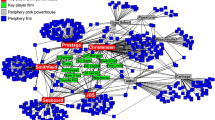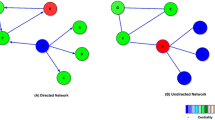Abstract
Loosely integrated and incomplete policy networks have been neglected in the literature. They are important to consider in terms of understanding network underperformance. The effective delivery and formulation of policy requires networks that are not incomplete or underperforming. The biopesticides policy network in the United Kingdom is considered and its components identified with an emphasis on the lack of integration of retailers and environmental groups. The nature of the network constrains the actions of its agents and frustrates the achievement of policy goals. A study of this relatively immature policy network also allows for a focus on network formation. The state, via an external central government department, has been a key factor in the development of the network. Therefore, it is important to incorporate such factors more systematically into understandings of network formation. Feedback efforts from policy have increased interactions between productionist actors but the sphere of consumption remains insufficiently articulated.
Similar content being viewed by others
Notes
A Google search brings up references to a pesticides sector. See, for example, http://www.pan-uk.org/Images/oldstyle/books/pestsapp.htm, accessed 27 March 2009).
This was held at Warwick HRI. For more information, see http://www2.warwick.ac.uk/fac/soc/pais/biopesticides/events.
REBECA stands for the ‘Regulation of Environmental Biological Control Agents’.
REACH stands for the ‘Registration, Evaluation, Authorisation and Restriction of Chemical Substances’.
For example: the various assurance schemes such as Nature's Choice from Tesco. The standard was developed to ensure that produce comes from growers who use good agricultural practices, operate in an environmentally responsible way and with proper regard for the health and well being of their staff. It was first introduced in 1991 to control chemical usage and develop environmentally sustainable production standards for Tesco's growers, see http://www.tescofarming.com/tnc.asp.
The public may be concerned about pesticide residues but they are not well informed about biological alternatives (and may be put off by the term biopesticides). Further research would be useful on public opinion perhaps through the use of focus groups and citizen's juries.
References
ADAS Consulting. (2003) Consultancy Services to Assist in the Preparation of a Strategy to Minimise Pesticides Residues in Food. For the Food Standards Agency: Summary Report.
Bevir, M. and Rhodes, R.A.W. (2003) Interpreting British Governance. London: Routledge.
Bevir, M. and Richards, D. (2009) Decentring policy networks: A theoretical agenda. Public Administration 87 (1): 3–14.
Borzel, T.J. (1998) Organizing Babylon: On the different conceptions of policy networks. Public Administration 76 (2): 253–273.
Botterill, L.C. (2005) Policy change and network termination: The role of farm groups in agricultural policy making in Australia. Australian Journal of Political Science 40 (2): 207–219.
Brundtland Commission. (1987) Our Common Future. Oxford: Oxford University Press.
Business Regulation Team. (2003) Regulatory Impact Unit: 2003 Report. London: Cabinet Office.
Cavanagh, M., Marsh, D. and Smith, M. (1995) The relationship between policy networks at the sectoral and sub-sectoral levels: A response to Jordan, Maloney and McLaughlin. Public Administration 43 (4): 627–629.
Dale, J. (2008) Microbial control products: The regulatory challenge. presentation to the 41st Annual Meeting of the Society for Invertebrate Pathology and 9th International Conference on Bacillus Thuringiensis, University of Warwick, UK, 3–7 August.
Daugbjerg, C. (1998) Policy Networks Under Pressure: Pollution Control, Policy Reform and the Power of Farmers. Aldershot, UK: Ashgate.
Daugbjerg, C. and Halpin, D. (2008) Organic farming: The evolving capacities of organic groups in the United Kingdom and Denmark. Paper for 58th PSA Annual Conference, Swansea University, 1–3 April.
Defra. (2006) Pesticides and The Environment: A Strategy for the Sustainable Use of Plant Protection Products. London: Defra.
Dowding, K. (1995) Model or metaphor? A critical review of the policy network approach. Political Studies 43 (1): 136–158.
Dowding, K. (2001) There must be end to confusion: Policy networks, intellectual fatigue, and the need for political science methods courses in British Universities. Political Studies 49 (1): 89–105.
Food Ethics Council. (2008) Food Distribution: An Ethical Agenda. Brighton, UK: Food Ethics Council.
Greaves, J. (2009) ‘Biopesticides, regulatory innovation and the regulatory’ state. Public Policy and Administration 24 (3): 245–264.
Greenaway, J., Salter, B. and Hart, S. (2007) How policy networks can damage democratic health: A case study in the government of governance. Public Administration 85 (3): 717–738.
Hay, C. (1998) The tangled webs we weave: The discourse strategy and practice of networking. In: D. Marsh (ed.) Comparing Policy Networks. Buckingham, UK: Open University Press, pp. 33–51.
Heclo, H. (1978) Issue networks and the executive establishment. In: A. King (ed.) The New American Political System. Washington DC: American Enterprise Institute, pp. 87–124.
Hindmoor, A. (2009) Explaining networks through mechanisms: Vaccination, priming and the 2001 foot and mouth disease crisis. Political Studies 57 (1): 75–94.
Hood, C., Rothstein, H. and Baldwin, R. (2003) The Government of Risk. Oxford: Oxford University Press.
Jordan, G. and Maloney, J. (1997) Accounting for subgovernments: Explaining the persistence of policy communities. Administration and Society 29 (5): 557–582.
Jordan, G., Maloney, W. and McLaughlin, A.M. (1994) Characterizing agricultural policy-making. Public Administration 72 (4): 505–526.
Keast, R., Mandell, M., Brown, K. and Woolcock, G. (2005) Network structures: Working differently and changing expectations. Public Administration Review 64 (3): 363–371.
Kenis, P. and Schneider, V. (1991) Policy networks and policy analysis: Scrutinizing a new analytical toolbox. In: B. Marin and R. Mayntz (eds.) Policy Networks: Empirical Evidence and Theoretical Considerations. Frankfurt am Main, Germany/Boulder, CO: Campus Verlag/Westview Press, pp. 25–59.
Lowe, P., Phillipson, J. and Lee, R. (2008) Socio-technical innovation for sustainable food chains: Roles for social science. Trends in Food Science and Technology 19 (5): 226–233.
Marsden, T., Flynn, A. and Harrison, M. (2000) Consuming Interests: The Social Provision of Foods. London: UCL Press.
Marsh, D. (ed.) (1998a) Comparing Policy Networks. Buckingham, UK: Open University Press.
Marsh, D. (1998b) The development of the policy network approach. In: D. Marsh (ed.) Comparing Policy Networks. Buckingham, UK: Oxford University Press, pp. 3–20.
Marsh, D. (1998c) The utility and future of policy network analysis. In: D. Marsh (ed.) Comparing Policy Networks. Buckingham, UK: Open University Press, pp. 185–197.
Marsh, D. and Rhodes, R.A.W. (eds.) (1992a) Policy Networks in British Government. Oxford: Clarendon.
Marsh, D. and Rhodes, R.A.W. (1992b) Policy communities and issue networks: Beyond typology. In: D. March and R.A.W. Rhodes (eds.) Policy Networks in British Government. Oxford: Clarendon, pp. 249–268.
Marsh, D. and Smith, M. (2000) Understanding policy networks: Towards a dialectical approach. Political Studies 48 (1): 4–21.
Parker, R. (2007) Networked governance or just networks? Local governance of the knowledge economy in Limerick (Ireland) and Karlskrona (Sweden). Political Studies 55 (1): 113–132.
Pross, P. (1986) Group Politics and Public Policy. Toronto, Canada: Oxford University Press.
Rhodes, R.A.W. (1981) Control and Power in Central-Local Government Relations. Farnborough, UK: Gower Publishing.
Rhodes, R.A.W. (1986) The Natural World of Local Government. London: Allen and Unwin.
Rhodes, R.A.W. (1988) Between Westminster and Whitehall. London: Unwin Hyman.
Rhodes, R.A.W. (1997) Understanding Governance: Policy Networks, Governance, Reflexivity and Accountability. Buckingham, UK: Open University Press.
Rhodes, R.A.W. (2000) The governance narrative: Key findings and Lesson's from the ESRC's Whitehall program. Public Administration 78 (2): 345–363.
Rhodes, R.A.W. (2006) Policy network analysis. In: M. Moran, M. Rein and R.E. Goodin (eds.) The Oxford Handbook of Public Policy. Oxford: Oxford University Press, pp. 425–446.
Rhodes, R.A.W. and Marsh, D. (1992) Policy networks in British politics: A critique of existing approaches. In: D. Marsh and R.A.W. Rhodes (eds.) Policy Networks in British Government. Oxford: Clarendon Press, pp. 1–26.
Richardson, J. and Jordan, G. (1979) Governing Under Pressure. Oxford: Martin Robertson.
Sabatier, P. and Jenkins-Smith, H.C. (1993) Policy Change and Learning: An Advocacy Coalition Approach. Boulder, Co: Westview.
Smith, M.J. (1993) Pressure, Power and Policy: State Autonomy and Policy Networks in Britain and the United States. London: Harvester Wheatsheaf.
Waage, J.K. (1997) Biopesticides at the Crossroads: IPM Products or Chemical Clones? In 1997 BCPC Symposium Proceedings Ni68: Microbial Insecticides: Novelty or Necessity? Bracknell, UK: BCPC Publications, pp. 11–19.
Acknowledgements
The authors thank Carsten Daugbjerg and Darren Halpin for their helpful comments on earlier drafts and also the Rural Economy and Land Use programme (RELU) for funding their research on the role of regulation in promoting biological alternatives to chemical pesticides.
Author information
Authors and Affiliations
Corresponding authors
Rights and permissions
About this article
Cite this article
Greaves, J., Grant, W. Underperforming policy networks: The biopesticides network in the United Kingdom. Br Polit 5, 14–40 (2010). https://doi.org/10.1057/bp.2009.15
Published:
Issue Date:
DOI: https://doi.org/10.1057/bp.2009.15




